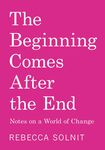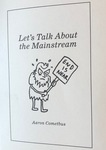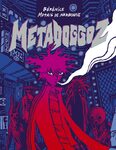
When despair hits, when ennui gets you down, it's art to the rescue... or not. Drawn employing an extreme clear line style throughout, in an unvarying 12-square-panel grid, in The Idiot it is the art itself that is the ultimate embodiment (reflection?) of the central theme of the work, that of a detached, machine-like process of art creation. Alwani, in so doing, has created a comics fable of Marx's dictum of the worker being alienated from their own labor under capitalism. Alwani's protagonist artist struggles to reclaim his connection to his self and to regain control of the direction of his being... but is this even possible?
Yes, you can read this entire work online (here, if you must know), but that's not really the same, is it? And won't doing so further the reader's (you, perhaps, in this instance) alienation from their own self, by submitting to the über-capitalism of the increasingly omnipotent digital realm? Whereas, by purchasing the physical work, the reader (again, perhaps, you) connects with the artist (by a mere one degree of separation, should you purchase it from Copacetic, as we received our copies directly from Alwani) and the physical world you both inhabit?
Think about it... and decide for yourself.

Now enters is third year of publication with a makeover. With this issue, the paper stock has switched from glossy stock to a medium weight, flat white paper. Good call: it looks and feels great; a bit more heft. As a result, it's price has increased to $12.99, but at a chock full 128 pages of great (mostly) full color comics, it's still a bargain!
And, more importantly, this issue features a stellar line up of comics creators, including many a Copacetic fave:
In the 21, full color pages of "The Gigs," E.S. Glenn shows the comics reading world what he is capable of. Socially constructed barriers between memory, dream, fiction and reality dissolve in Glenn's spirit world of clear line comics (and comics within comics!) in this densely packed (magnifying glass, anyone?), multi-layered graphic novella that takes readers deep into the comics dimension . Get ready for a treat!
The inimitable Sami Alwani really knocked himself out here, with his piece,"The Misfortunes of Virtue," which is actually an agglomeration of short bits that coheres together into a whole that is greater than the sum of it's parts, an oroboros look at the artist in society that turns things inside-out and back again.
Noah van Sciver revisits a prior work in a meta/auto-bio take on "Saint Cole."
Walt Holcombe's "Cheminant avec Emily" integrates a poster graphics æsthetic with comics to illuminate the soundtrack of romance.
With "The Intoxicated," Maggie Umber employs a minimal but evocative black and white rendering reminiscent of faded celluloid images, to good effect.
Tara Booth takes on "Binge Eating."
New-to-us talents, Veronika Muchitsch, Henry McCausland and Zuzu all turn in excellent and quite varied pieces.
And it all starts off with an eye-catching Al Columbia cover followed by a Theo Ellsworth one-pager.
The New Now is here!

The clear nod to the seminal work by Roland Barthes in the choice of title (taking it as far as to also “quote" its cover color and font; nice touch) will inform knowing readers that this is a work of ambition and that attention will need to be paid in order to experience all it has to offer. Each of the many pieces collected here – representing the bulk of Alwani’s comics output over roughly the last five years – contains multiple layers of signification below the surface. And, while, of course, Alwani plainly wants to confront readers with the reality of a gay sexuality and sex between men, he also obviously doesn’t want readers to stop there. These stories work hard and work well to situate sexuality in culture and society, to relate personal lives to professional lives, to connect individual needs and wants to life events that may have triggered them, and, ultimately, to delineate a relationship between states of mind and the nation state itself.
Employing a graphic toolkit that, while informed to varying degrees by that of fellow Torontonians Patrick Kyle and Michael DeForge, is clearly his own, Alwani successfully conveys emotional registers through both line and composition – as well as color, in those instances when it is employed. He does so, in part, by intermingling the inner and outer lives of his stories' protagonists – who are, most often, to varying degrees, stand-ins for himself (despite, more often than not, being depicted as a dog). These characters’ names' slight difference from his own – Simmie Antlflick, Sunny Balwani, Saehmeh the Dog, Sami/Baby – registering both the awareness that these characters are not, in actuality, him (cannot sufficiently embody him) at the same time as, on the other side of the mirror, revealing that he does not feel entirely comfortable wholly identifying himself with his own name, as printed on the book jacket, recognizing that it is illusory, if not deceptive, to consider that a name can fully represent anyone's actual identity. (This could also be related to the fact that any representation of his given name employing the Latin alphabet remains a transliteration of the original Arabic from which it is ultimately derived.)
While the majority of these pieces were previously (mostly self-) published – including his breakthrough work, “The Dead Father,” which went on to be selected for the 2017 volume of Best American Comics, and Copacetic fave, “The Idiot” along with many others – there are several major new pieces here that are among his most substantial, including two which, along with the aforementioned “The Idiot” and the also previously published “Persona”, have been given – intriguingly ironic – referential titles: “American Psycho” and “Atrocity Exhibition”. Perhaps (or, perhaps not) taking a page out of Kathy Acker’s playbook, these titles add yet another layer to the dense signification that is Alwani’s trademark.
And, finally, amidst and intermingled with all this challenge and confrontation there is also a humane and empathic display of human wants and needs, along with the emotions that both their denial and fulfillment bring. Sami Alwani’s Pleasure of the Text is a unique, challenging and rewarding volume. And you don’t have to take just our word for it. Some real comics heavyweights have have enthused about it, as well:
“Sami Alwani is the quintessential cartoonist of the interregnum. – this period of flux between the collapse of capitalism and the rise of something else. “The Dead Father,” and his other stories describe in fascinating detail the heartbreaking struggles of a young cartoonist in search of professional and social status in the midst of a broken culture. I hope that readers will recognize his bravery.” – Ben Katchor
“I love Sami Alwani’s style, his tender flat hysteria, and his naked honesty. And the way he depicts queerness is so reoved from the cuddly rainbow-tinged pop culture – it’s beautiful and raw, and very very real.” – Roman Muradov
“Alwani is one of, if not THE most exciting new practitioners of alternative comic art. This is an essential collection of vibrant, exploratory, modern cartooning. Much to meditate on.” – Simon Hanselmann
It looks like this may now be out of print :(... We're trying to see if any copies are available anywhere, so maybe check back in a bit and see.










